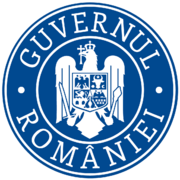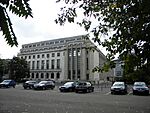Government of Romania facts for kids
Quick facts for kids Government of RomaniaRomanian: Guvernul României |
|
|---|---|

Logo of the Government of Romania
|
|
| Overview | |
| Established | 1862 |
| State | Romania |
| Leader | Prime Minister |
| Appointed by | President |
| Responsible to | Parliament of Romania |
| Headquarters | Victoria Palace Bucharest |
| Website | http://gov.ro/en |
The Government of Romania (Romanian: Guvernul României) is a big part of how Romania is run. It works with the President of Romania to lead the country. The Government is led by the Prime Minister of Romania. It includes many different ministries, offices, and 42 local offices called prefectures. The main office of the Romanian Government is at Victoria Palace in Bucharest.
This Government is the main authority that carries out the country's plans. It works based on trust from the Parliament of Romania. Its job is to manage Romania's activities both inside the country and with other nations. The President of Romania chooses the Government. This choice must then be approved by the Parliament.
Contents
How the Romanian Government Works
The Government of Romania follows rules set by the country's Constitution. It also uses a special plan called the Government Program. This program explains what the Government wants to achieve. It covers goals and steps for all areas of activity.
To reach its goals, the Government does many things. It plans new ideas, creates rules, manages public services, and represents Romania. It also uses its power to make sure the country runs smoothly.
Who Leads the Government Now?
The current Government is led by Marcel Ciolacu. He is the leader of the Social Democratic Party (PSD).
How a New Government Starts
When a new Government is needed, the President starts the process. The President chooses a person to be the Prime Minister. This choice usually comes after talking with the political party that has the most seats in Parliament. If no party has a clear majority, the President talks to all parties.
Once chosen, the Prime Minister candidate has about 10 days. In this time, they create a list of people for the Government. They also write down their plans for the country. This 10-day period is a guide, not a strict rule. If the candidate takes too long, the President can choose someone else.
After the list and plan are ready, the candidate asks Parliament for approval. Parliament discusses the plan in a joint meeting. Parliament can only say no to a candidate twice within 60 days. If Parliament cannot agree on a candidate in this time, the President can then dissolve Parliament. This means new elections would be held.
If Parliament approves the candidate, the plan becomes official. The President then confirms all the people on the Government list. After this, the Government members take an oath and start their work.
What Does the Government Do?
The Government's main job is outlined in the Constitution and other laws. It leads the country's public administration. This means it manages many public services and departments.
The Government also creates plans to put its goals into action. It can suggest new laws. It also talks with other countries to make international treaties. The Government represents Romania both at home and abroad. It also appoints local leaders called prefects. The Government must also share information with Parliament when asked.
Working with Parliament
The Government is responsible to Parliament. It must keep Parliament informed. Members of Parliament can ask questions or make interpellations. These are formal requests for information.
Sometimes, a part of Parliament (like the Chamber of Deputies or Senate) can make a simple motion about an interpellation. In serious cases, Parliament can vote to remove the Government. This is called a motion of censure. If it passes, the Government must resign.
The Government can also make special rules called ordinances. These rules have the same power as regular laws. This happens when Parliament gives the Government special permission. These ordinances might need Parliament's approval later. In urgent situations, the Government can make emergency ordinances. These do not need special permission first. But they must be approved by Parliament to become permanent laws.
How the Government is Organized
The Constitution of Romania says there are two main types of Government members. These are the Prime Minister and the ministers. Other roles are added by special laws. These can include deputy prime ministers or state ministers. A "state minister" is a senior role. They help the Prime Minister coordinate different ministries.
The Prime Minister is the leader of the Government. They manage all its activities. The Government also has a working team. This includes the Prime Minister's own office and the General Secretariat of the Government. Other departments can also be created.
The Prime Minister's office includes their personal staff. This includes state-secretaries and state-counselors.
Government Departments and Offices
The Government has several important departments that help it run.
General Secretariat of the Government
This is a public office that works under the Prime Minister. It is led by a general secretary. This office manages the budget for the Government and many public institutions.
Department for Combating Fraud - DLAF
This department works with the European Anti-fraud Office (OLAF). Its job is to protect the money from the European Union. It checks how EU funds are used in Romania.
Control Body of the Prime Minister
This group checks the work of ministries and other public offices. It makes sure they follow the rules. It can check government bodies, companies owned by the state, and local public services.
Department for Interethnic Relations
This department works on issues related to different ethnic groups in Romania. It helps promote good relations between them.
Ministries
The Romanian Government has twenty ministries. Each ministry focuses on a different area. For example, there are ministries for finance, health, education, and defense.
Here are some of the ministries:
- Ministry of Finance
- Ministry of Internal Affairs
- Ministry of Foreign Affairs
- Ministry of Justice
- Ministry of National Defence
- Ministry of Economy
- Ministry of Energy
- Ministry of Transport and Infrastructure
- Ministry of Agriculture and Rural Development
- Ministry of Environment, Water and Forests
- Ministry of Development, Public Works and Administration
- Ministry of Investments and European Projects
- Ministry of Labour and Social Solidarity
- Ministry of Health
- Ministry of Education
- Ministry of Research, Innovation and Digitalization
- Ministry of Culture
- Ministry of Sport
- Ministry of Family, Youth and Equality of Opportunity
- Ministry of Entrepreneurship and Tourism
Prefectures
Prefectures are local offices of the Government. They help manage things in different parts of Romania.
How Laws are Made by the Government
The Prime Minister leads the Government meetings. These meetings happen every week or whenever needed. They discuss important topics about Romania's policies.
During meetings, the Government works on new laws and rules. They also review reports and other documents. The meeting agenda is usually split into two parts.
The Government makes two main types of rules: decisions and ordinances. Decisions help carry out existing laws. Ordinances are special rules made when Parliament gives permission.
Steps to Make a Decision
Making new rules or laws happens in two main steps:
- Step 1: Preparation Meeting. This is where different ministries work together. They discuss and agree on new plans and laws.
- Step 2: Government Meeting. This is the final step. The Government decides whether to approve or reject the new plans or laws.
See also
- List of Romanian governments
- List of institutions subordinated to the Government of Romania


